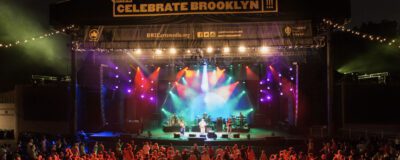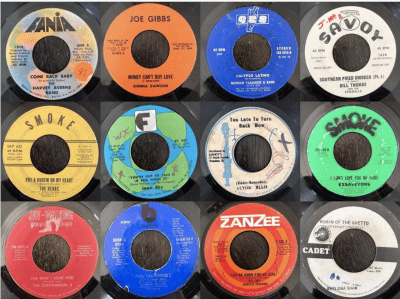Members of old-school hardcore punk band Urban Waste perform at a benefit show for U Street Music Fest (photo by Oscar Salazar, Unostar)
U Street Music Fest to highlight the spectrum of Bushwick locals, transplants and punks
A first-of-its kind festival uplifting underrepresented music and art communities comes to Maria Hernandez Park this weekend
Maria Hernandez Park is the heart of Bushwick. On any given day, you’ll find families and friends picnicking, paleteros and punks, skateboarders making use of its swaths of concrete, dogs playing, people working out and music — occasionally from someone pushing a loudspeaker in a cart — blaring from multiple directions. The streets jutting off from the park exhibit more of the same, with diverse and rapidly changing groups of people living amongst each other as they create art, raise families and everything in between.
The organizers behind U Street Music Fest could think of no better place to host their inaugural event, to be held April 22 on Suydam Street. The free, all-ages festival will feature nine bands on two stages and multiple DJs, as well as activities and food from neighborhood businesses. There will be open turntables from 11 a.m. to 1 p.m. to encourage more music sharing.
“Bushwick is a neighborhood that is rapidly changing. There’s a lot of gentrification happening. And a lot of families, mostly Latino families, that have been living in the neighborhood are now being displaced,” says festival organizer Diana Hernandez. “This is an opportunity to create a crossroad for the spectrum of the people that live in Bushwick today. [Maria Hernandez] is just a perfect spot for people passing by to discover new music and learn about what the different creators are doing.”
View this post on Instagram
An outgrowth of nonprofit audio visual documentary collective Urbano Street, the U Street Music Fest was born out of a desire to enable more collaboration among New York’s diverse alternative music scenes.
“People from the different subculture scenes used to hang out in the same spaces and collaborate, and because of the pandemic, some of that got lost,” Hernandez says. “We thought the festival was the perfect way to reach out to other artists, collectives, other musicians, other promoters, or people that have been supporting these music communities.”
U Street’s lineup is proof that New York’s musical community can thrive regardless of circumstance. Among the performers on April 22 are hardcore punk band Rebelmatic, ska group The Scofflaws, theatrical queer musicians Chico Raro and Hecho En Brooklyn, who “represent what we do and our concept so much because they’re merengue punk. They’re family friendly, fun, alternative, and Black and brown,” Hernandez says.
Building community beyond Suydam Street
Creating ties that bind began with U Street’s organizing collective, a panel of folks from organizations including DIY community Punk Island, fellow documentarians Los Herederos and a handful of event promoters and musicians. “We invited organizations that we thought would be a great fit for what we’re doing and share the same mission,” Hernandez continues. “People in the organizing collective didn’t know each other — and keep in mind, we’re using the same venues, live in the same neighborhood, and oftentimes use similar musicians!”
To raise funds for the U Street fair, Urbano Street and its partners held five fundraising shows at different venues ahead of the festival – each focusing on a different corner of New York music, from ska-reggae, to rock ‘n’ roll and Latin fusion. The musicians performing at the benefits will be able to access the green room during the festival, “another space to for musicians to get to know each other,” Hernandez says.
Urbano Street received a grant from the Brooklyn Arts Council to create this first-ever festival, but also enlisted the help of neighborhood businesses in true DIY spirit. Multiple restaurants will offer food and a local Salvadorean restaurant will provide power. Organizations including neighborhood bar Santa Salsa, promotion platform Groover and financial rights organization HiFi (where Hernandez is an engagement manager) are also sponsors.
“It’s a team effort,” Hernandez says, adding: “As people of color, we often don’t have the same resources, or don’t come from a heritage that has a lot of resources. So we thought it was a perfect way to unite and help each other for our community.”
Pulling up at Urbano Street
The festival is an extension of Urbano Street’s mission to support underground creators. Founded in 2012 by Lucho Parra, a Colombian immigrant and documentarian, the DIY project centered on filming musicians of all genres and providing them with high quality footage to add to their press kits and social media with the hope of getting more shows. All of which was done for free, using trade and collaborative models.
“In New York, you have the whole world in one city. You have all backgrounds, all this fusion of music. The city is like a stage, so let’s discover music and document it,” Parra told Remezcla in 2020. Adds Hernandez, “We started Urbano as a way to support artists that usually don’t get the funding or support or visibility, like a lot of the mainstream music like pop or reggaeton.”
Hernandez, who is also Colombian, met Parra at now-shuttered Williamsburg venue the Swamp in 2014 and became a partner in Urbano Street in 2018. Together they developed their U Capture live performance series, which evolved into socially distant, smaller-scale captures called U Window during the pandemic.
“Lucho has always wanted to do events on the street, because subcultural people relate to street culture and one of the goals of the festival is to foster collaboration among likeminded individuals,” Hernandez says.
Ultimately, Parra and Hernandez hope to make U Street Music Fest a biennial event that elevates the work of everyone involved.
“I would just be super happy if I started seeing more collaborations being born from the event,” Hernandez says, adding that she’s already noticed some of that work taking place after early benefit shows. “Being able to get visibility — not just for the artists, but the people behind them — would be awesome. That’s the goal for sure.”
You might also like 


























